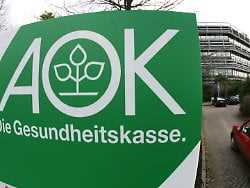deficit of four billion euros
AOK pulls cash register finances deep into the red
02/18/2022, 10:05 p.m
After two years of the pandemic, health insurance companies are deep in the red. The deficit of the AOK with more than four billion euros probably breaks all historical records. Nevertheless, the health insurance representatives warn politicians against blaming the development solely on the corona virus.
The pandemic years are tearing huge holes in the budget of the health insurance companies: According to a newspaper report, the Allgemeine Ortskrankenkassen (AOK) are reporting an unprecedented deficit for the past year. According to preliminary data available from the “Frankfurter Allgemeine Zeitung” (FAZ), the financing gap last year was 4.1 billion euros. That was 1.5 billion euros more than the AOK reported in the first three quarters, the paper wrote. And it meant a quadrupling of the AOK deficit of 2020. For comparison: in 2019 the financial deficit of the association was only 121 million euros, in 2018 and 2017 there were even whopping surpluses of more than one billion euros, the report goes on to say.
The other associations, such as those of the replacement, company and guild health insurance companies, have not yet published their figures. However, they too were in the red up to the third quarter, with the exception of the small agricultural funds and the large substitute funds. At that time, the entire system had reported minus 3.2 billion euros. Even if the substitute health insurance association should have expanded its small surplus of 70 million euros in the fourth quarter, no fundamental improvements in the GKV finances are to be expected in view of the overwhelmingly bad AOK data, the “FAZ” calculates. 2021 could therefore go down in GKV history as one of the worst or maybe even the worst year ever.
People went to the doctor less during the pandemic
In addition to the AOK, the small miners’ association also presented their annual figures. She incurred a deficit of 104 million euros, slightly less than 2020 with 138 million at the time. Knappschaft managing director Bettina am Orde made it clear, however, that the burden was not due to the corona pandemic. On the contrary, there was a “pandemic-related reluctance on the part of the insured to claim insurance benefits,” said Orde according to the “FAZ”.
Rather, the shortfall has to do with the capital levy, i.e. the recourse to the reserves. The previous federal government with Health Minister Jens Spahn had imposed this on the health insurance companies in order to stabilize the GKV finances. Orde complained that such funds would have had to dig deep into their pockets “which had been economical with insured persons’ money in the past”. The Knappschaft had to pay 187 million euros to the health fund. Across all coffers, the wealth levy was 8 billion euros. Orde demanded: “The health insurance companies immediately need a reliable financial basis and planning security for the coming years.”
Dissolution of the financial reserves brought AOK into distress
The local health insurance companies also feel that they have been badly hit, and they also cite special effects as an explanation for the poor performance. The AOK community was “disproportionately” burdened by the dissolution of the financial reserves, namely with 4.2 billion euros, said the new chairwoman of the AOK federal association, Carola Reimann.
As far as the future cash situation is concerned, Reimann warned: “Now our reserves are largely used up.” At the same time, after the Corona wave, “strong catch-up effects and an increase in expenditure can be expected in the near future”. According to the head of the association, the new federal government must react to this: “In view of our weakened financial basis and a worsened competitive position, we expect politicians to send clear signals for financial stabilization.”
